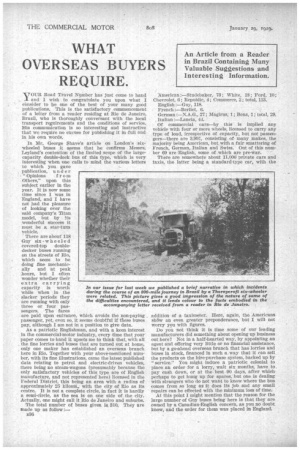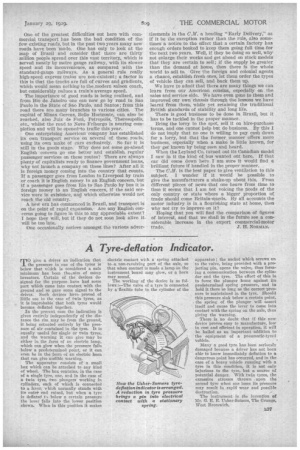WHAT OVERSEAS BUYERS REQUIRE.
Page 20

Page 21

If you've noticed an error in this article please click here to report it so we can fix it.
'JOUR Road Travel Number has just come to hand and I wish to congratulate you upon what I tensider to be one of the best of your many good publications. This is the satisfactory com.mencement of a letter from a reader residing at Rio de Janeiro, Brazil, who is thoroughly conversant with the local transport reguirements and the conditions of service. His communication is so interesting and instructive that we require no excuse for publishing it in full and in his own words.
In Mr. George Shave's article on London's sixwheeled buses it. seems that he confirms Messrs. Leyland's contention of the limited scope of the largecapacity double-deck bus of this type, which is very interesting when one calls to mind the various letters to which you gave publication, under
• "Opinions from Others," upon this subject earlier in the year. It is now some time since I was in England, and I have not had the pleasure of looking over the said company's Titan model, but by its wonderful success it must be a star-turn vehicle.
There are about 118 Guy six-wheeled covered-top doubledecker buses running on the streets of Rio, be
ic
ak which seem to doing flue mechan ally and at pe hours, but I often wonder whether their extra carrying capacity is worth while when in the slacker periods they are running with only three or four pas sengers. The fares are paid Upon entrance, which avoids the non-paying, passenger, yet, even so, it seems doubtful if these buses pay, although I am not in a position to give data.
As a patriotic Englishman, and with a keen interest in the commercial-motor industry, every time that your paper comes to hand it upsets me to think that, with all the fine lorries and buses that are turned out at home, only one maker has established an overseas branch here in Rio. Together with your above-mentioned number, with its fine illustrations, came the latest published data relating to petrol and electric-driven vehicles, there being no steam-wagons (presumably because the only satisfactory vehicles of this type are of English manufacture, and not represented here) licensed in the Federal District, this being an area with a radius of approximately 25 kiloms., with the city of Rio as its centre. It is not a complete circle, in fact it is hardly a semi-circle, as the sea is on one side of the city. Actually, one might call it Rio de Janeiro and suburbs.
The total number of buses given is 310. They are made up as follow :— B36 addition of a taximeter. Here, again, the 'Americans show an even greater preponderance, but I will not worry you with figures. Do you not think it is time some of our leading manufacturers did something about opening up business out here? Not in a half-hearted way, by appointing an agent and offering very little or no financial assistance, but by a go-ahead overseas branch that has lorries and buses in stock, financed in such a way that it can sell the products on the hire-purchase system, backed up by "service.' You might induce a patriotic colonial to place an order for a lorry, wait six months, have to pay cash down, or at the best -90 days, after which perhaps to get hung up for spares, but one is dealing with strangers who do not want to know where the bus comes from so long as it does its job and any small repairs can be effected with the minimum loss of time. At this point 1 might mention that the reason for the large number of Guy buses being here is that they are owned by a Canadian-English concern, as you no doubt know, and the order for them was placed in England.
One of the greatest difficulties out here with commercial transport has been the bad condition of the few existing roads, but in the past two years many new roads have been 'made. One has only to look at the map of Brazil and consider that there are thirty million people spread over this vast territory, which is served mostly by metre gauge railway, with its slower speed and its inconvenience, as compared with the standard-gauge railways. As a general rule really high-speed express trains are non-existent ; a factor in this is that the tracks are full of curves and gredients, which would mean nothing to theenodern saloon coach, but considerably reduce a train's average speed.
The importance of good roads is being realized, and from Rio de Janeiro one can now go by road to Sao Paulo in the State of Sao Paulo, and Santos ; from this road there are many branches to various cities. The capital of Minas Gereas, Bello Horizonte, can also be reached, also Juiz de Fore, Petropolis, Theresopelis, etc., whilst the road to Novo Friburgo is nearing completion and will be opened-to traffic this year.
One enterprising American company has established Its own transport service on several of these roads, using its own make of cars exclusively. So far it is still in the goods stage.Why does notsome go-ahead English concern go one better and establish regular passenger services on these routes? There are always plenty of capitalists ready to finance government loans, why not launch a company on these lines? After all it is foreign money coming into the country that counts. If a passenger goes from London to Liverpool by train or coach it is English money to an English.concern,. but if a passenger goes from Rio to Sao Paulo by bus it is foreign money he an English concern, if the said service were in existence, and which otherwise would not reach the old country.
A new era has commenced in Brazil, and transport is on the point of rapid expansion. Are any English concerns going to figure in this to any appreciable extent? I hope they will, but if they do not soon look alive it. will be too latee •
One occasionally notices amongst the various adver tisements in the C.M. a heading "Early Delivery," as
if it be the exception rather than the rule, also sometimes a notice to the effect that a certain factory has enough orders booked to keep them going full time for the next two years. Well, if they be doing so well, why not enlarge their works and get ahead on stock models
that they are certain to sell ; if the supply be greater than the demand at home, then there is the whole world to sell to. Give the foreign and colonial -agents a chance, establish fresh ones, let them order the types of vehicle they can sell, and back them up.
We have to admit that there are many things we can learn from our American cousins, especially on the sales and service side. We have even gone to them and improved our own chassis through the lessons we have learnt from them, while yet retaining the traditional British standards of stability and long life.
There is good business to be done in Brazil, but it has to be tackled-in the proper manner.
Bring the lorry to the spot, sell it on hire-purchase terms, and one cannot lielp but do business. By this I do not imply that no one is willing to pay cash down for a lorry, but that the former manner offers more business, especially when a make is little known, for they get known by being seen and heard.
When the Leyland Co. turned out its Canadian model I saw in it the kind of bus wanted out here. If that car did come down here I am sure it would find a brilliant future if handled in the proper manner.
The G.M. is the best paper to giveventilation to this subject. I wonder if it would be possible to
give the manufacturers a shake-up about this. From different pieces of news -that one -hears from time to time it seems that I, am not voicing the needs of the only country or state where a bigger proportion of trade should come l3r1tain-wards. By all accounts the motor industry is in a flourishing state at home, thenwhy not' try to improve on it?
Hoping that you will find the comparison of figures of interest, and that we ehall in the future see a considerable increase in the export commercial-motor trade. J. H. NORMAN.


































